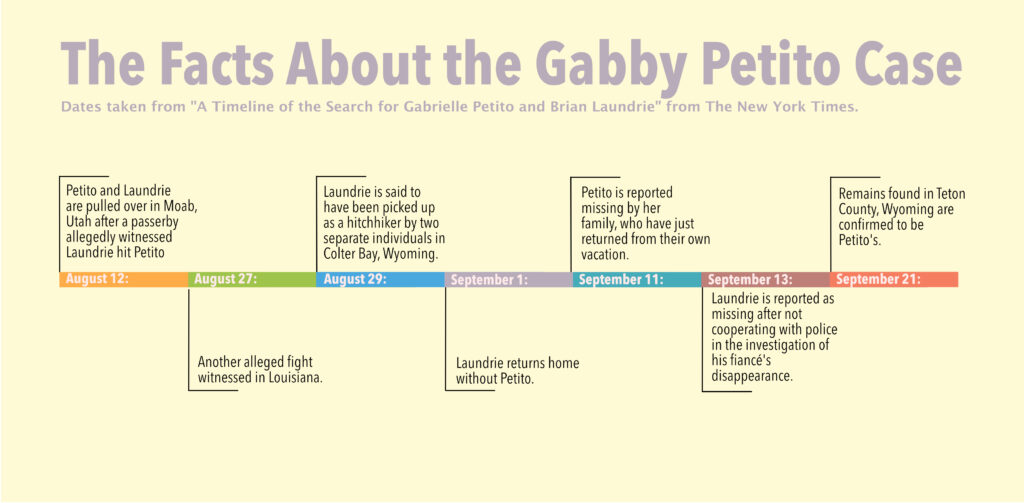By: Candice Stilwell, staff writer

Two months ago, Gabby Petito, 22, and her fiancé Brian Laundrie, 23, started a cross country road trip that ended in Petito’s death.
There is no denying that what happened to Gabby Petito is a horrible tragedy. However, Susan English, associate professor and chair of the integrated media department at Gonzaga University, suggests that her death is also a missed opportunity for an important conversation.
English’s Media & Democracy, a 400-level course, recently discussed Petito’s murder. “We talk in such a way that really we are talking about domestic violence; we’re talking about two people who apparently were in love becoming violent toward each other,” says English.
The media is approaching this case as if it is just a “love story gone bad,” as English put it. In reality, if it is a case of domestic violence, it’s a far more serious issue that we need to examine – one that can only be examined once the investigation is over, once we can definitively say what happened and when.
“There’s now money to be made,” said English. Platforms such as Netflix, Hulu or Peacock may have intentions to make a documentary following the story of Gabby Petito as a result of the popularity of her case. It seems that there may have been a murder resulting from domestic violence, and people are finding a way to profit from it.
The media has been following this story like it is a thriller novel, neglecting Petito’s humanity.
After eyewitnesses alerted police about a possible physical altercation between Petito and Laundrie in their vehicle, police pulled them over. As the investigation was unveiled to the general public, the police body camera footage (shown below) was released, depicting a distressed Petito.
According to The Washington Post, Petito told police she was hit by Laundrie prior to her disappearance. This evidence, paired with interviews of Petito’s close friends and family, have led many to believe that Petito’s murder was a case of domestic abuse.
However, while Utah law calls for police interference in a domestic violence call-out, Petito and Laundrie were only separated for the night. In some states, with evidence of a physical incident, police must take one of the parties into custody.
English said, “This would have been a perfect opportunity to let the story unfold as a domestic violence example. The pervasiveness of domestic violence, even within the intimate partner relationship… seems to just have gotten lost in the shuffle.” We cannot forget to have important conversations like this. We cannot push these things aside and not worry about that aspect of Petito’s situation, which may have been the cause of her death.
We could have talked about how our laws should support survivors of domestic violence and how qualified professionals should be allowed to intervene in situations like Petito’s. If Utah state law had been different, Petito might have been safely separated from Laundrie and the whole situation could have been straightened out before she died. Now we are left wondering what could have been avoided. If the laws in place had more jurisdiction to help people dealing with domestic violence, would Petito still be alive?
We could have also talked about the warning signs of domestic abuse and what people can do to help their loved ones in need of assistance. It would have been an opportunity to promote crisis hotlines, professional intervention, couples counseling, personal counseling and other resources available to people in unsafe relationships.
The media had not only an opportunity, but a responsibility, to help us discuss this ongoing issue. And they fell short.
